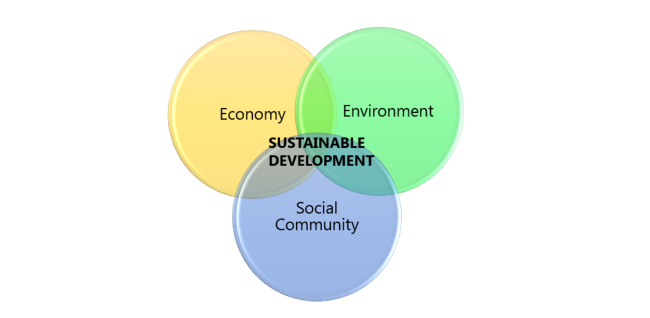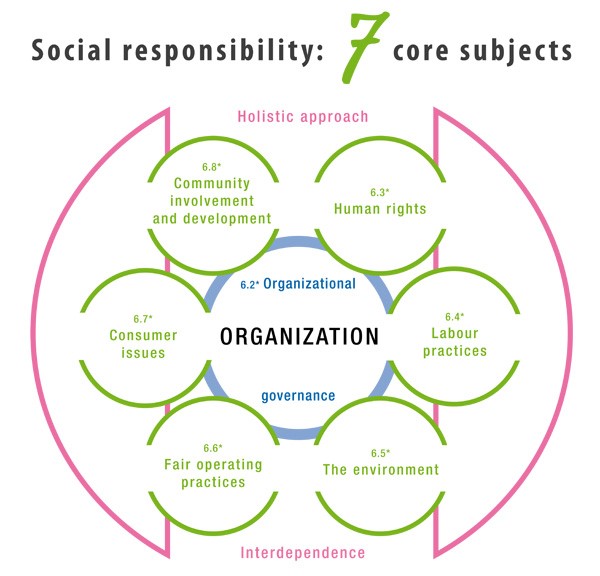December 10, 2015
By Ashley
In
 In a previous blog we spoke about Climate Change and its consequences. When we study this subject, a certain term is often used: “sustainable development”. In fact, for the majority of people, sustainable development is only linked with environment and Climate Change issues. What is sustainable development really? Is it possible to address these issues in a company? Since the Industrial Revolution (1750), man has been using up a lot of the miner al resources like coal, metal ore, after gases and oil, and agriculture has become more and more intensive. Therefore, the population of the planet is increasing whereas the natural resources are decreasing. From the ‘70s onwards, oil shocks have arrived one after another and the world suddenly became aware of this dependence on natural resources and that these natural resources aren’t renewable. In 1987, the Brundtland Commission's report defined sustainable development as "development which meets the needs of current generations without compromising the ability of future generations to meet their own needs". The concept supports
economic, social development and the importance of protecting natural resources. However, economic and social development shouldn’t destroy the environment. Therefore, sustainable development stays on 3 issues:
economic, social and environmental. These 3 points are inseparable.
Intergenerational solidarity is also crucial; all development has to take into account its impact on the opportunities for future generations.
In a previous blog we spoke about Climate Change and its consequences. When we study this subject, a certain term is often used: “sustainable development”. In fact, for the majority of people, sustainable development is only linked with environment and Climate Change issues. What is sustainable development really? Is it possible to address these issues in a company? Since the Industrial Revolution (1750), man has been using up a lot of the miner al resources like coal, metal ore, after gases and oil, and agriculture has become more and more intensive. Therefore, the population of the planet is increasing whereas the natural resources are decreasing. From the ‘70s onwards, oil shocks have arrived one after another and the world suddenly became aware of this dependence on natural resources and that these natural resources aren’t renewable. In 1987, the Brundtland Commission's report defined sustainable development as "development which meets the needs of current generations without compromising the ability of future generations to meet their own needs". The concept supports
economic, social development and the importance of protecting natural resources. However, economic and social development shouldn’t destroy the environment. Therefore, sustainable development stays on 3 issues:
economic, social and environmental. These 3 points are inseparable.
Intergenerational solidarity is also crucial; all development has to take into account its impact on the opportunities for future generations.
 During the Glorious Thirty the common way of thinking was “There is one and only one social responsibility of business — to use its resources and engage in activities designed to increase its profits” (1962, Milton Friedman - laureate of
Nobel Memorial Prize in Economic Sciences). However, parallel to environmental issues, civil society wants companies to become more social and ethical. This is the beginning of
Corporate Social Responsibility (CSR). CSR is the tool to integrate sustainable development in company’s strategies. According to the ISO 26 000 norm (the CSR norm), having a CSR policy permits
an organisation to be responsible “
for the impacts of its decisions and activities on society and the environment, through transparent and ethical behaviour that:
During the Glorious Thirty the common way of thinking was “There is one and only one social responsibility of business — to use its resources and engage in activities designed to increase its profits” (1962, Milton Friedman - laureate of
Nobel Memorial Prize in Economic Sciences). However, parallel to environmental issues, civil society wants companies to become more social and ethical. This is the beginning of
Corporate Social Responsibility (CSR). CSR is the tool to integrate sustainable development in company’s strategies. According to the ISO 26 000 norm (the CSR norm), having a CSR policy permits
an organisation to be responsible “
for the impacts of its decisions and activities on society and the environment, through transparent and ethical behaviour that:
- contributes to sustainable development, including the health and welfare of society;
- takes into account the expectations of stakeholders;
- is in compliance with applicable law and consistent with international norms of behaviour;
- is integrated throughout the organisation and practices in its relationship”
 Companies should identify their
stakeholders. A stakeholder is an individual or group that has an interest in any decision or activity of an organisation. Employees, suppliers and customers are always stakeholders but shareholders, non-governmental organisations, labour unions, residents, etc. can also be stakeholders. According to this definition, we understand that sustainable development and CSR aren’t just environmental issues. Humans are at the heart of sustainable development and the most important thing is that organisations
make decisions in regards to social responsibility and sustainability. For this, the ISO 26 000 norm proposes
7 core subjects (see picture below) and in order to be sustainable, organisations should have policies and actions in link with these 7 issues.
Companies should identify their
stakeholders. A stakeholder is an individual or group that has an interest in any decision or activity of an organisation. Employees, suppliers and customers are always stakeholders but shareholders, non-governmental organisations, labour unions, residents, etc. can also be stakeholders. According to this definition, we understand that sustainable development and CSR aren’t just environmental issues. Humans are at the heart of sustainable development and the most important thing is that organisations
make decisions in regards to social responsibility and sustainability. For this, the ISO 26 000 norm proposes
7 core subjects (see picture below) and in order to be sustainable, organisations should have policies and actions in link with these 7 issues.

Source: IS0 26000 norm
If we link these 7 subjects with the stakeholders, we see that companies can’t choose one stakeholder category like clients or shareholders and in this way prioritise to the detriment of other stakeholders. Employees and their working conditions are essential. It’s easy to understand that good working conditions in factories are vital, but they are also important in office work. For example, stressful management can be improved with a real separation between professional and private life, so here are some tips for decrease the stress and to be responsible:- Don’t call an employee or don’t oblige your employee to answer in your mail late in the evening;
- Don't organise a meeting after 6 o'clock to allow for your employees to return home without being too late;
- Don’t give urgent jobs at the end of the day or just before the weekend, a responsible manager knows how important it is to manage his schedule and his team schedule;
- Encourage telework when it is possible, working from home one day per week would encourage concentration and motivation and decrease fatigue.
 Being a socially responsible organisation is not just having some policies; it is a
real commitment, respecting stakeholder’s interests (including employees and suppliers), Human rights, laws, and the International Norms of behaviour. Companies improve their actions and policies day after day, being transparent about the policies, decisions, and activities for which they are responsible, and including ethics, equity, and integrity in their behaviour. It is a
continuous improvement approach. It is important to understand CSR should be integrated into all your governance and inall your departments, from human resources to sales, passing through marketing or production departments. According to the ISO 26 000 norm, having an effective CSR policy and working to become a sustainable company has an influence on other things:
Being a socially responsible organisation is not just having some policies; it is a
real commitment, respecting stakeholder’s interests (including employees and suppliers), Human rights, laws, and the International Norms of behaviour. Companies improve their actions and policies day after day, being transparent about the policies, decisions, and activities for which they are responsible, and including ethics, equity, and integrity in their behaviour. It is a
continuous improvement approach. It is important to understand CSR should be integrated into all your governance and inall your departments, from human resources to sales, passing through marketing or production departments. According to the ISO 26 000 norm, having an effective CSR policy and working to become a sustainable company has an influence on other things:
- It is a competitive advantage;
- Gives your company a very good reputation;
- Gives an ability to attract and retain workers or members, customers, clients or users;
- Improves the maintenance of employees' morale, commitment and productivity;
- Improves the view of investors, owners, donors, sponsors and thefinancial community; and
- Improves the relationships with companies, governments, the media, suppliers, peers, customers and the community in which it operates.

